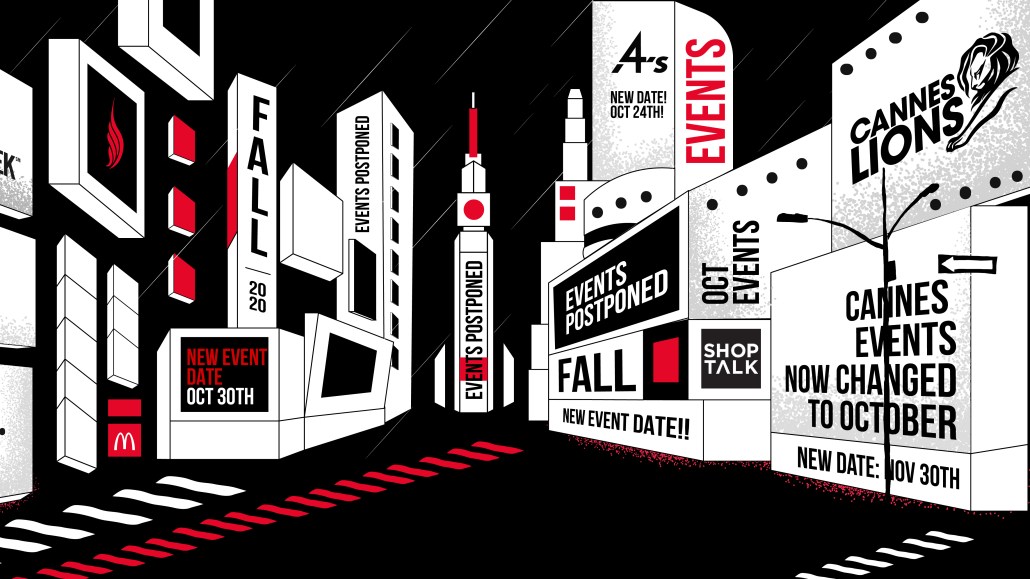Secure your place at the Digiday Media Buying Summit in Nashville, March 2-4

The Atlantic’s annual September festival is the brand’s largest event of the year, accounting for approximately a third of the company’s overall events revenue, according to COO Aretae Wyler.
Not wanting to lose out on the content, audience or revenue, the publisher is following suit with many others and turning the festival virtual. Its events team, however, is now 80% smaller than it was two months ago.
This means the event will have less programming as the remaining staff leans on the other parts of The Atlantic in order to pull off the four-day-long event. The festival will also need to be promoted widely across the internet in order to achieve the publisher’s ambitious target: The Atlantic wants a million people to “attend” the festival this year, up from the 2,000 in-person attendees it normally attracts.
The in-person version of The Atlantic Festival spanned three days with four to five hours of main stage content each day. This year, the “main stage” has been relegated to a 90-minute block of evening programming that will be live streamed to audiences on its site and via other platforms over the four nights of September 21 through 24. During the days, smaller forums and panels will take place as well.
In past years, The Atlantic Festival capped its audience to 2,000 to 3,000 due to space limitations. This year, scale is the goal.
Just two months out, the publisher has run some house ads in its magazine, but Wyler said her team will be posting promos on its social media channels and sending them out through its email lists and partner email lists.
The Atlantic traditionally earns 20% of its revenue from events, according to the company, with the vast majority of that revenue coming from sponsorships.
This year, the company’s estimate is that events will account for only 5-10% of the company’s overall revenue while doing solely virtual events.
The publisher laid off the majority of its events team during a round of layoffs in May that resulted in 68 staffers, or 17% of its total workforce to be cut. Within that, its events division, Atlantic Live, dropped from 50 employees to 10.
The remaining 10 now work more closely with the company’s other divisions, including in-house agency Re:Think, in order to use that division’s creative, video and production skills. It is also using virtual event platform vendor Tame to host the event.
“We are looking at the outlook for [virtual] events and there is some possibility that we will grow again and bring more staff on,” said Wyler.
This year, the Atlantic Festival will be free to attract a larger crowd.
It will be monetized through the help of nine advertisers. Last year’s event, by comparison, had 16 total sponsors.
Wyler added that, commensurate with the reduction in production costs of the event, sponsorship fees have decreased a bit year over year, though she would not disclose by how much.
Last year, The Atlantic produced more than 100 events. Since going remote, it has put on 20, and Wyler said she anticipates that her team will eventually get to the point of having one virtual event per week. Some have been sponsored, but others were solely editorial products.
The virtual events that the brand has held so far are bringing in roughly five to 10 times the number of attendees that they would in-person.
While an in-person forum event might have had 50 to 150 in attendance, depending on the venue size, Wyler said the virtual events have on average had 750 to 1,000 registrants.
“The more interactivity you put into any of these [events], the better and the more effective it’s going to be,” said Ben Hindman, CEO of events marketing platform Splash. However, he added that he does not think that massive scale events, like the one that The Atlantic’s aiming to put on, will be able to achieve the required networking and interaction.
To attempt to accomplish this, The Atlantic Festival will include smaller break out sessions and 20-person roundtables during the daytime portions of the festival to give attendees the chance to speak directly to the presenters and the editors, said Wyler.
More in Media

Media Briefing: Turning scraped content into paid assets — Amazon and Microsoft build AI marketplaces
Amazon plans an AI content marketplace to join Microsoft’s efforts and pay publishers — but it relies on AI com stop scraping for free.

Overheard at the Digiday AI Marketing Strategies event
Marketers, brands, and tech companies chat in-person at Digiday’s AI Marketing Strategies event about internal friction, how best to use AI tools, and more.

Digiday+ Research: Dow Jones, Business Insider and other publishers on AI-driven search
This report explores how publishers are navigating search as AI reshapes how people access information and how publishers monetize content.





